If you’re an English speaker, you might have trouble using the French subjunctive. It comes up a lot in the comments on Comme une Française!
Today, let’s discover this piece of French grammar in more detail, so you can master it once and for all.
Want all the vocabulary of the lesson ?
1 - The French subjunctive: overview
Le subjonctif, the French subjunctive, is a special conjugation for French verbs.
It’s actually a grammatical mood (a collection of conjugations, like “the conditional” or “the imperative”) with two main tenses:
- Le subjonctif présent → The most common one, which we’ll explore today. I’ll call it “le subjonctif” for short.
- Le subjonctif imparfait → The stereotypical sign of very formal French, with a complicated conjugation. We never use it in everyday French, especially in spoken conversations. It’s not of much use to you, so I won’t mention it again in this lesson.
English speakers have to face two problems with the subjunctive:
1. When should you use it? (The rules are complicated and full of exceptions.)
2. How does it work? (It’s a whole new conjugation!)
The conjugation for regular verbs is relatively straightforward, but it often makes irregular verbs even more irregular.
One quick (but important) thing: Don’t worry. Le subjonctif might feel scary and important – but it’s not. Yes, you should know about it so you don’t get confused when people use it. But if you use the usual present tense instead of the subjunctive, French people won’t look down on you. You’ll learn with practice, and when making mistakes. So go ahead! Speak French even if you don’t know all your conjugation tables. Go make mistakes! It’s a really important part of learning.
Don’t spend too long on le subjonctif. Instead, why not practice your oral comprehension? Expand your vocabulary? Even explore other tenses. That will get you much closer to speaking and understanding French with confidence. A few tips and conjugation tables (like those we’ll cover in this lesson) can already go a long way.
2 - The French subjunctive: A few conjugation tables
I cover the conjugation for le subjonctif présent throughout the video lesson, especially in the final part (because conjugation tables are necessary, but boring.) In this blog post, though, we’ll cover them all in this section.
Feel free to read them quickly, and come back to the tables when you find the appropriate verbs in the examples later!
Regular verbs: all verbs that end in -er in the infinitive (except Aller)
The verbs that end in -er in the infinitive (except Aller) make le premier groupe, the group of French regular verbs.
Their subjunctive is very easy: it almost looks just like le présent de l’indicatif, the usual present tense!
For example:
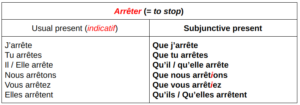
→ It’s easy! It’s just like the usual present tense, except the added “i” for “Nous” and “Vous.”
→ In French sentences, the subjunctive always follows “que” (or “qui”), so we often add it to the conjugation table.
The endings are the same for all first group verbs. So, for example, we also have:
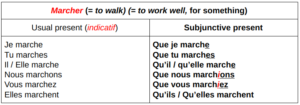
Regular verbs (the extra mile): second-group verbs
Le deuxième groupe (= the second group of French verbs) is made up of the several verbs ending in -ir that end in “-issons” with “Nous” in the present.
For example: finir (= to end / to end up), réunir (= to join, to reunite) or grandir (= to grow / to grow up).
They all share the same conjugations. Their subjunctive makes:
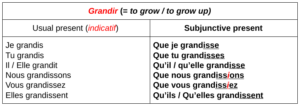
However, most verbs in -ir are actually from the third group (“irregulars”), so learning the conjugation of the second group isn’t as useful as the first.
The most common irregular verbs you should learn first:
Third group verbs often make smaller groups who share the same subjunctive. But there are still too many of them to count.
Instead, let’s learn the conjugation for the most common French verbs you need to know.
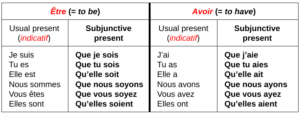
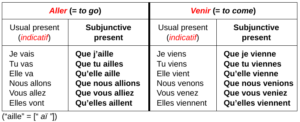
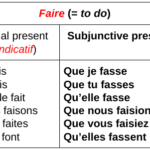
3 - The French subjunctive: when do we use it?
So when do we use le subjonctif?
Let’s focus on the most common uses:
- Vouloir que (= wanting that…)
Je veux que [+ subjonctif] = I want (that…)
Je veux que tu sois meilleur à l’école. = I want you to be better at school.
(literally: “I want that you [be in the subjunctive] better at school”)
Now, as you can see, the subjunctive applies to a second verb in the sentence, with a second subject. (The first verb is “veux”, and the first subject is “Je”.)
** Le truc en plus : When the subject is the same for both verbs, we’d rather simply use l’infinitif. Such as: Je veux être meilleur à l’école. (= “I want to be better in school.”) **
Je veux que ce soit fait rapidement. = I want it be done quickly.
Il veut que je sois là à 17h. = He wants me to be there at 5pm.
Another common use:
- Il faut que [+ subjunctive] (= It’s necessary that…)
Il faut que tu sois là à 18h. = It’s necessary for you to be there at 6 pm. / You need to be there at 6 pm. (= “It needs to be that you be there at 6 pm”, literally.)
Il faut que nous soyons plus gentils. = We need to be nicer.
Il faut que j’aie de meilleures notes. = I need to have better grades.
**Le truc en plus : “Il faut que” is impersonal – like “It’s necessary” where the “it” doesn’t really refer to anything. The personal version of “Il faut” is devoir (= must.) Such as : Tu dois être là à 18h. Or Nous devons être plus gentils.**
A third situation where the subjunctive comes in handy:
- Je ne pense pas que [+ subjunctive] (= I don’t think that…)
This one is more complicated.
Penser que (= Thinking that…) or Croire que (= Believing that / Thinking that…) require the subjunctive after them when the sentence is negative. In the affirmative, we use the usual present!
That’s why we sometimes say that the subjunctive is used for doubt or uncertainty.
Je pense que [+ usual present] Je ne pense pas que [+ subjunctive]
Je crois que [+ usual present] Je ne crois pas que [+ subjunctive]
Je pense qu’il est là. Je ne pense pas qu’il soit là.
(= I think he’s here.) (= I don’t think he’s here)
Tu crois que j’ai raison. Tu ne crois pas que j’aie raison.
(= You believe I’m right.) (= You don’t believe I’m right.)
→ J’ai / J’aie sound the same in spoken French. That’s why you don’t have to worry too much about the subjunctive – even when you make mistakes, it won’t matter too much… and most of the time nobody will even notice it!
Finally, le subjonctif is also used in other expressions like:
- Quoi que / Qui que / Où que [+ subjunctive] (= Whatever / Whoever / Wherever [+ verb])
Quoi que je fasse, j’ai des problèmes. = Whatever I do, I get problems.
Où que je sois, je pense à toi. = Wherever I am, I think of you.
Qui que vous soyez, je vous demande de partir. = Whoever you are, I’m asking you to leave.
- Jusqu’à ce que [+ subjunctive] (= Until [+ verb])
Je cours avec toi jusqu’à ce que tu arrêtes. = I’ll run with you until you stop.
There are many more uses of the French subjunctive, but now that you know these main ones you can practice and learn more as you go.
4 - The French subjunctive: Quiz!
Did you get all of that? Let’s practice and see what you remember, with a little quiz!
1. Il faut que j’y [+ aller]. (= I have to go.)
→ What’s the correct form for “aller” here?
2. Elle veut que tu [+ changer] de chemise. (= She wants you to get another shirt.)
→ What’s the correct form for “changer” here?
3. Je pense que [“ce” + être] par là. (= I think it’s this way.)
→ What’s the correct form for “être” with the subject “ce” (“it”) here?
4. Je ne pense pas que [“ce” + être] par là. (= I think it’s this way.)
→ What’s the correct form for “être” with the subject “ce” (“it”) here?
Answers:
1. Il faut que j’y aille.
It’s in the subjunctive, with “il faut que.” By the way, it’s also a common sentence to use when you want to end a conversation!
2.Elle veut que tu changes de chemise.
It’s in the subjunctive after “vouloir que.” However, with “tu,” first group verbs don’t change between the usual present and the subjunctive.
3. Je pense que c’est par là.
With “Je pense que…” in the affirmative, we don’t use the subjunctive! And “ce + est” = c’est (= “it’s.”)
4. Je ne pense pas que ce soit par là.
In the negative sentence “Je ne pense pas que…,” we do use the subjunctive!
Congratulations! How many of these did you get right?
You don’t need to know a lot of verbs to start using your French. Get started (and improve your French) with some more lessons:
- 7 Common French Verbs You Need to Know
- L’impératif – An easy mood to give orders and advice
- Practice your understanding of real spoken French!
À tout de suite.
I’ll see you in the next video!
And now:
→ If you enjoyed this lesson (and/or learned something new) – why not share this lesson with a francophile friend? You can talk about it afterwards! You’ll learn much more if you have social support from your friends 🙂
→ Double your Frenchness! Get my 10-day “Everyday French Crash Course” and learn more spoken French for free. Students love it! Start now and you’ll get Lesson 01 right in your inbox, straight away.
Click here to sign up for my FREE Everyday French Crash Course

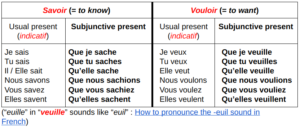
Thank you for teaching me when to use a subjunctive verb
Thank you! This was very helpful!
My mistake: absence of autoplay button means default “off,” not “on.”
I made my other comment on the basis of the text alone. Since, tried to watch the video, but couldn’t find the “autoplay” link to turn off. I only leave autoplay on on those occasions where my brain has fallen out. Not your fault of course. It’s something Youtube (=Google) is trying to do – take away our choice and have us accept the status of zombies. But anyway, if Google takes away that choice altogether, then I stop watching Youtube videos altogether.
Mostly, people have tried to explain the subjunctive via a focus on the semantics, almost treating syntax as a bit of a nuisance to be brushed aside, whereas I have always felt the need for a series of Boolean questions: If A, then what next? This podcast has gone further than most towards answering a couple – the main ones – of those. However, I still feel the need to mine that “que” for all it is worth. What about when it is the object of the subordinate clause. I think I know the answer, but I still feel a cold, Freudian grip on my consciousness, such that I am constrained from using French – even here, in written form – till I know for certain; meaning of course that I rarely use French, and therefore don’t hone my fluency or correctness, thereby remaining incorrect and unfluent. That does at least afford a certain perversely satisfying logic.
J’ai coupe de foudre de français
MERCI BEAUCOUP C’EST TRES PRACTIQUE, JE SUIS ENTRAIN DE PREPARE POUR MON DIPLOME DE DELF J’ESPERE QUE J’AILLE PASSE L’EXAMEN
thank you so much! I’ve been looking for an easy subjonctif website to help me learn subjonctif for WEEKS and yours is the BEST. Thank you so so much! you really helped me
Lovely presentation and a tolerant approach of the subjunctive!
Encouraging for non-French speakers.
Well done!
Geraldine You make it so simple You are a great teacher.
Merçi a vous, je comprends un peu mieux maitenant
that was amazing and i have really enjoyed it
but i am abit confused with the conjugasion of the verb “faire” in subnjoctif especially with second person plural and first person plural pronouns.
Bonjour,
No problem. Pas de problème. The subjunctive can indeed be confusing.
« faire » is an irregular verb and the forms in the subjunctive are as follows :
que je fasse
que tu fasses
qu’il, elle, on fasse
que nous fassions
que vous fassiez
qu’ils ou elles fassent
I hope this helps.
Bonne journée,
Fabien
Comme Une Française Team
With time you’ll learn
Merci Géraldine je comprends plus maintenant.
Merci beaucoup Géraldine. Maintenant je comprends le subjonctif.
trivial but: Pourquoi “de” avant chemise??
Je veux que tu changes DE chemise. Merci, this lesson was a good review.
Hi Judy!
That’s a great question, and the answer is tricky!
Short answer:
– “Il a changé sa chemise” // “Il a changé la chemise” = He changed the shirt he had, he made modifications to his shirt.
– “Il a changé DE chemise” = He put on another shirt.
Longer answer:
“Changer” can have different meanings (or rather, different range?) depending on the sentence around it.
Mainly:
1. If there’s no “object” after it, then it’s the subject who has “changed” (just like in English : “Tu as changé, mec” = “You changed, man.”)
2. If there’s “de + [object]” after it, then the “object” has been swapped for another one. “Je vais changer de banque.” = I’m going to switch to another bank.
3. If there’s an object without the “de” preposition, then the object has been modified. “Je vais changer ma recette, je vais rajouter des légumes” (= “I’m going to modify my recipe, I’ll add more vegetables.”)
However, it’s not as clear-cut, the distinctions are fuzzy. “Changer de” always means “to swap for another one,” but “changer” by itself can have both meanings 2 & 3.
For instance we say “J’ai changé l’ampoule.” (= I changed the lightbulb) to mean “I swapped the broken lightbulb for another one that’s new.”
So you could say “Je veux que tu changes ta chemise.” and it would be interpreted the same way, in the right context.
Have a great day,
– Arthur, writer for Comme une Française
Am I the only person who has discovered, over the past couple of weeks, that the video runs for about 2 minutes, then stops as if it is “buffering”. However, there is no problem with my ‘Livebox’, and even after reading the lesson, it is still the same. Any advice would be appreciated. Thank you
I had the same problem.
J’ai le même problème. Il suffit de cliquer sur le bouton de progression à l’endroit où il s’arrête pour qu’il redémarre.
Why had nobody put this so simply before ? Bravo Géraldine
Bonjour Géraldine et merci pour cet leçon je l’ai trouvé très utile
Bonne journée
Bonjour Géraldine, merci pour cette leçon très utile. Le subjonctif me confond toujours ! Helena
Merci, Géraldine!
A mon avis, le subjonctif semble élégant en anglais. Merci Géraldine.
J’ai enfin maîtrisé le subjonctif quand je me suis rendu compte que le subjonctif existe (a peu mais il existe) en anglais, ma langue maternelle:
« It is important that you BE on time »:
Il est important que tu SOIS à l’heure
« It is necessary that she be attentive »:
Il faut qu’elle SOIT attentive
I learned about English subjunctive with the song “If I WERE a rich man” from the musical “Fiddler on the roof” :))
You’re right, Charles. There is subjunctive in English. But we are much less insistent on using it than the French. For example, you could say “It is important that you are one time” and no one would bat an eyelid.